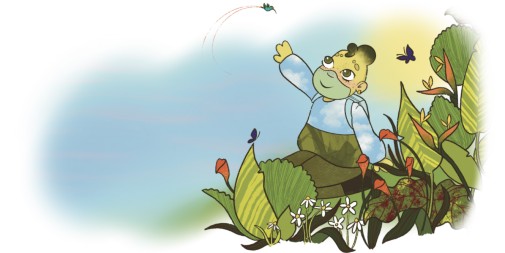The work of York scientist inspires children’s story
Posted on 19 May 2021
 The story was written by award-winning author Patrice Lawrence and illustrated by artist educator Amara Lawrence. Pic credit: Amara Lawrence / National Centre for Atmospheric Science
The story was written by award-winning author Patrice Lawrence and illustrated by artist educator Amara Lawrence. Pic credit: Amara Lawrence / National Centre for Atmospheric Science
Grandma’s Footsteps prompts readers to take note of changes in their environment, and to imagine what they want their own future to look like.
Lockdown
The story was inspired by air quality research led by Professor James Lee, which showed that the air became cleaner for a short while during the UK’s first Covid-19 lockdown.
The fictional story, commissioned by the National Centre for Atmospheric Science, was written by award-winning author Patrice Lawrence and illustrated by artist educator Amara Lawrence.
The story is set inside the domed city of Etherley and explores why air pollution is changing in different ways and different places, and how it affects people.
When the city’s delicate balance is toppled, and patching up the sagging dome isn’t working anymore, protagonist Hy Knowshole follows in their grandma’s footsteps to find out how to restore clean air.
Captivating
Through Hy’s journal entries, readers experience a captivating account of life in Etherley, which unfolds as readers scroll down.
Author Patrice Lawrence said: “Whether we are adults, children or young people, stories help shape how we see the world around us. As we emerge from difficult times, I hope a funny story can help children feel empowered to improve their local environment.”
Through collaboration between creatives, scientists and school children, Grandma’s Footsteps employs the power of storytelling to engage young people with the latest environmental research.
Air pollution is one of the largest environmental health risks we face today. It not only poses a threat to our environment, but to our health too, causing around 36,000 deaths a year in the UK.
Massive shifts to low pollution behaviours, like not using our cars, gave us a glimpse of what the future could look like, with clear benefits to us all - especially children who are more vulnerable to the impacts of air pollution.
Emissions
Professor Lee, an atmospheric chemist at the National Centre for Atmospheric Science and University of York, said: “Air pollution, especially from vehicle exhausts, affects all of us and is a severe risk to our health and wellbeing. During the Covid-19 lockdowns, traffic reduced significantly, leading to a drop in levels of key air pollutants such as nitrogen dioxide and small particles. Whilst this effect will be short-lived, it has given us a window into a future where exhaust emissions are reduced due to the electrification of the vehicle fleet.”
To help the storymakers engage with the perspectives of young readers, the themes and style of Grandma’s Footsteps were developed in collaboration with sixty Year Five pupils at Beckfoot Heaton Primary School in Bradford - a designated clean air zone city. The students submitted hand-drawn illustrations, showing the impacts of air pollution and ways to achieve a world with cleaner air.
Zoe Mawson, Headteacher at Beckfoot Heaton Primary School, said: “Learning about air pollution and all environmental issues is so important. We need to empower children so that they are able to help shape positive environmental changes. We were delighted to be part of Grandma's Footsteps and proud of our children's ideas and art work.”
Learning
Grandma’s Footsteps is shared online for free, alongside a set of learning resources for Key Stage 2 which offer educators science explainers, suggestions for discussion points, and activities for further learning.
Amara Lawrence, illustrator and trainee Art Therapist, said:“We should never underestimate art’s ability to tell and support stories about social issues that are hard to talk about or explain. For children, art can be an accessible point of entry into discussion about their world. Air pollution is a problem that affects us all so children shouldn’t be left out of the conversation, especially those who are most affected by it. Art is a way of exploring questions which we might not ask otherwise.”
Further information:
The National Centre for Atmospheric Science was awarded a grant by the Natural Environment Research Council (NERC), as part of UK Research and Innovation’s (UKRI) rapid response call to Covid-19.
Explore more news

Boreal forest and tundra regions worst hit over next 500 years of climate change, study shows
Monday 8 April 2024

Researchers developing ultra-sensitive blood test with potential to revolutionise diagnosis of Alzheimer’s
Thursday 4 April 2024

Attitudes to being an adult are shifting as traditional milestones become out of reach, new study finds
Wednesday 27 March 2024

Scientists uncover evidence that microplastics are contaminating archaeological remains
Thursday 21 March 2024

More evidence needed to understand consumer behaviour around no and low-alcoholic drinks
Tuesday 19 March 2024
